What if there were a way to avoid chemical fertilizers on gardens, pastures, and orchards? What if that way involved a fertilizer that conserved water, was easily accessible to every single human on this planet, and was absolutely free? The use of this substance is also scientifically backed* as a means to increase production. If you haven’t figured it out by now, I am speaking of using human urine as fertilizer.
Rather put another kind of waste in the garden? Make this easy worm bin!
Before the “eww!” factor comes into play, let me explain a few things. Feces is the offending element of human waste that is considered unsafe due to bacteria. Human urine is full of nutrients your soil needs. From nitrogen to phosphorous it is a wonderful source of nutrients big and small.
Is urine sterile?
According to this study:
In our previously reported study (4), we used 16S rRNA gene sequencing to demonstrate evidence of uncultivated bacteria in the adult female bladder and we questioned the “sterile urine” dogma. Our current study demonstrates that urine contains communities of living bacteria that comprise a resident female urine microbiota.
So, no. urine is not actually sterile, but it is safe to use as fertilizer in your garden.
Grow Some Greens!
Ready to grow fresh greens, no matter WHERE you live? Sign up for my
FREE quick-start guide and start growing some of your own food!
New to gardening? Limited on space? The 5-Gallon Garden gives you the skills you need to grow food in the space you have. Get started with your garden today!
Urine as fertilizer: Statistically proven to increase yields
This age-old fertilization practice has been brought back by many looking to harness all of the resources close to them in order to lessen their environmental impact. This has led to research on the practice of applying human urine as fertilizer.
One such study involved smallholders in Uganda and the application of urine at two different concentrations in comparison to a controlled plot. The evidence was clear: “Compared to the control plot, all treatments show a statistically significant difference in yield.”
How much is “statistically significant”? The plot with the optimum urine volume application led to a two-fold production rate of maize over the control plot.
That is significant.
Urine as fertilizer – applying it safely
Safety is, of course, of the utmost concern in fertilizing with human urine, just as it is with animal manure application to improve soil.
While urine is considered safe, there are rare occurrences of bacterial infection that can contribute to bacterial problems around your plants. The solution is simple. If it’s possible that the donor could have a bladder or urinary tract infection, do not take their samples for your garden, field, or orchard.
The same goes for anyone who is taking medication which can be excreted in urine. They should stick to using the toilet.
Along the same lines, the question of how fresh should the urine be is also of utmost importance. In this study human urine was collected and stored in covered containers in the donors’ homes for two weeks in order to protect against pathogens. There is a wide range of opinions on how fresh the urine should be but allowing the urine to sit for a couple of weeks seems the safest of all of the approaches.
The other factor to keep in mind is where to apply this homegrown fertilizer. When using urine as fertilizer, it is generally accepted that applying it to the soil away from the leaves of the plants is preferable. Urine is not applied as a foliar spray, as many organic fertilizers often are, but rather directly to the soil near the base of the plants.
The Ugandan study used the following method: “The urine was applied close to the ground in furrows along the plant rows, which were immediately covered with soil. Besides preventing ammonia losses, this practice helps to reduce the smell and avoid burning crop leaves.” (Kirchmann and Pettersson, 1995)
How much is enough/too much?
The final consideration – and it is an important one – is what volume of urine should be applied to the crops and how much should it be diluted? What is interesting about the Ugandan study is that they cited the urine application as direct and undiluted.
Nearly every source out there will tell you that you need to dilute the urine with water at a 10:1 water to urine ratio. And that is what we have historically practiced in our own gardens and orchards.
However, direct application of urine as fertilizer seems to have worked well in a larger field setting where maize – known as corn in the United States – was grown. With no sprawling vines or low-lying leaves, you can see how this application is quite different than a small homestead garden.
I think the lesson here is that you don’t want the urine to directly contact the plant at full concentration. If you are doing diverse crops with low-lying foliage, dilution may be your best bet to prevent any type of damage to the plant.
How we collect our urine for fertilizer
The simplest method that we implement on our homestead is to place a bucket outdoors, behind a cove of trees. While the men in the family are working out on the land, this is their designated bathroom spot. Depending on how many bucket-fillers you have in your family, you can harvest a half-bucket full every week or so. Set this aside for garden fertilization.
As I share in my book, The Doable Off Grid Homestead, if you are implementing a bucket system or outhouse:
You can design toilet systems that both men and women can use to help divert the urine into a separate container for use on the homestead. Look online for a little piece of equipment called a urine diverter. It is installed into the box of the composting toilet and can be piped to a removable container that can then be poured off for fertigation.
Other Ways to Improve Plant Health
- Use leaves to create leaf mulch
- Learn how to compost
- Use eggshells in the garden
- Put your chickens to work
*Sources:
- https://www.sciencedirect.com/science/article/pii/S0959652614000948
- https://www.usatoday.com/story/news/nation/2022/05/21/human-urine-fertilizer-sustainable/9824078002/?gnt-cfr=1
Originally published in January, 2019; this post has been updated.

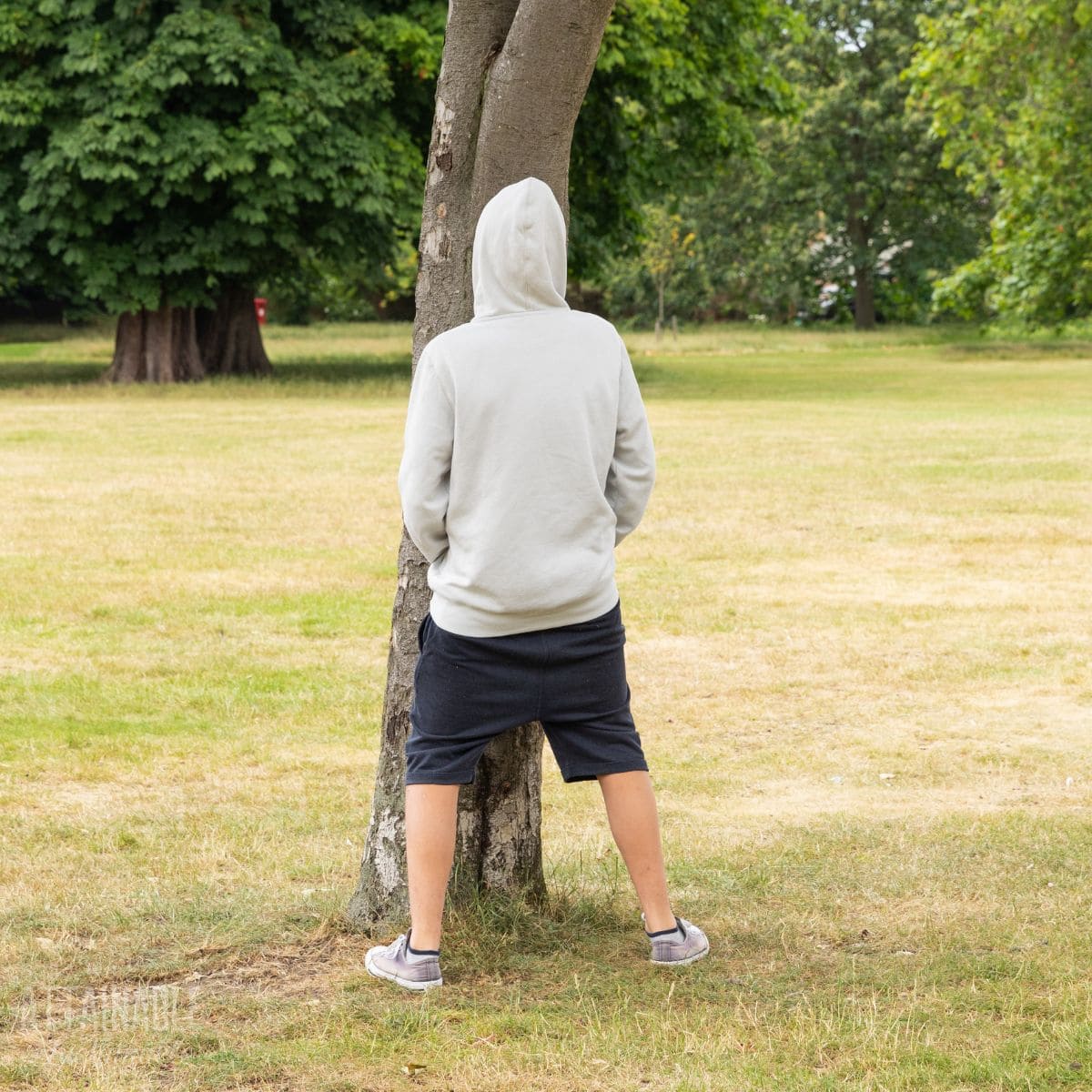

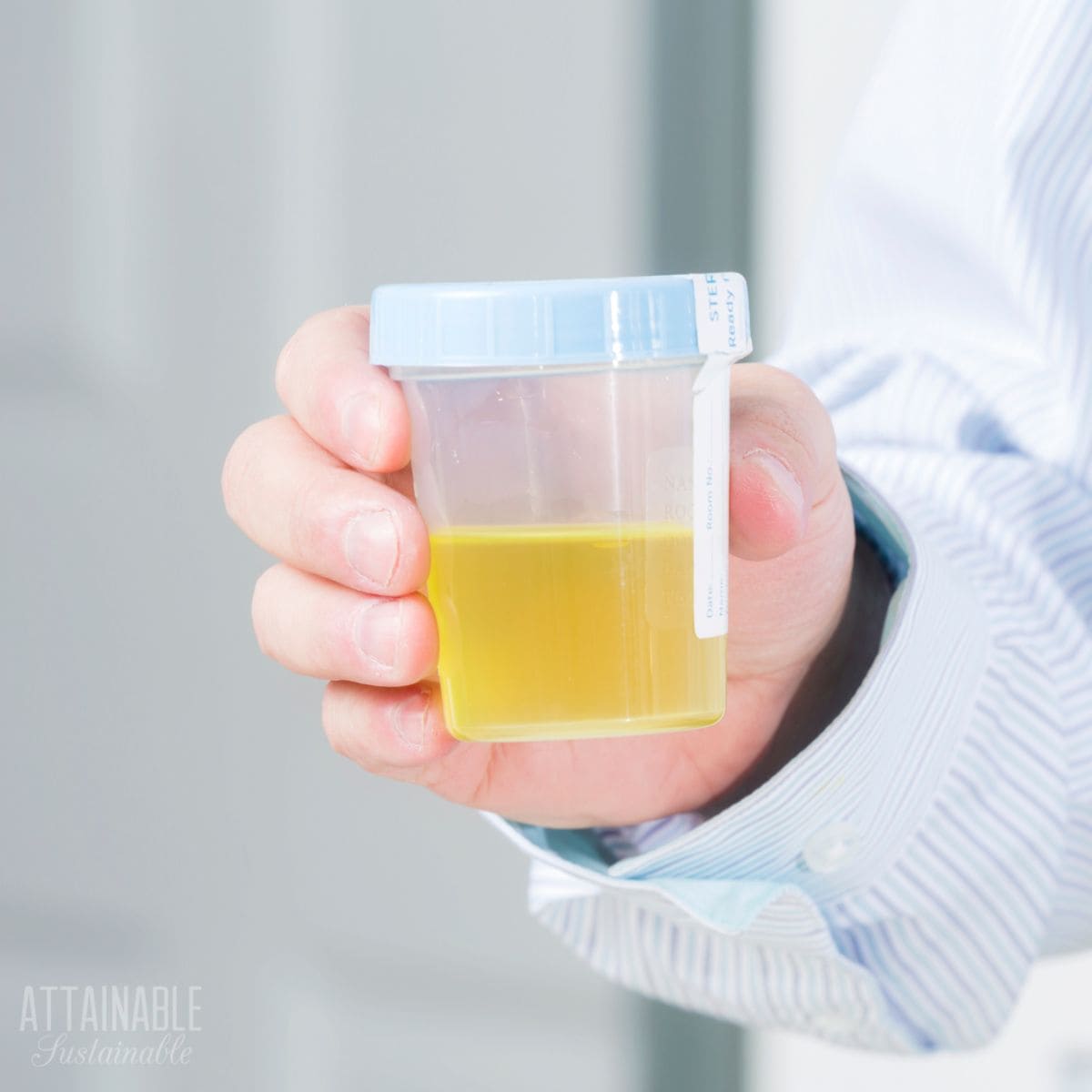
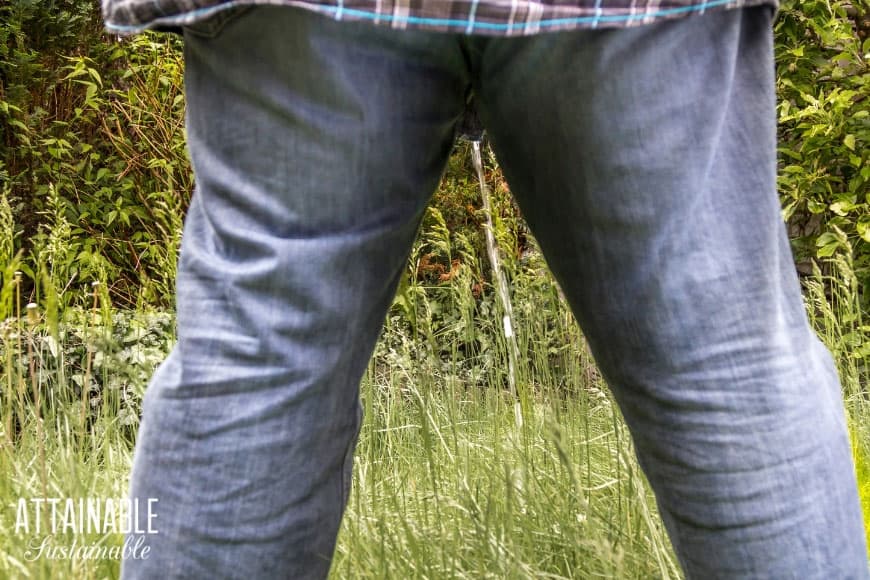
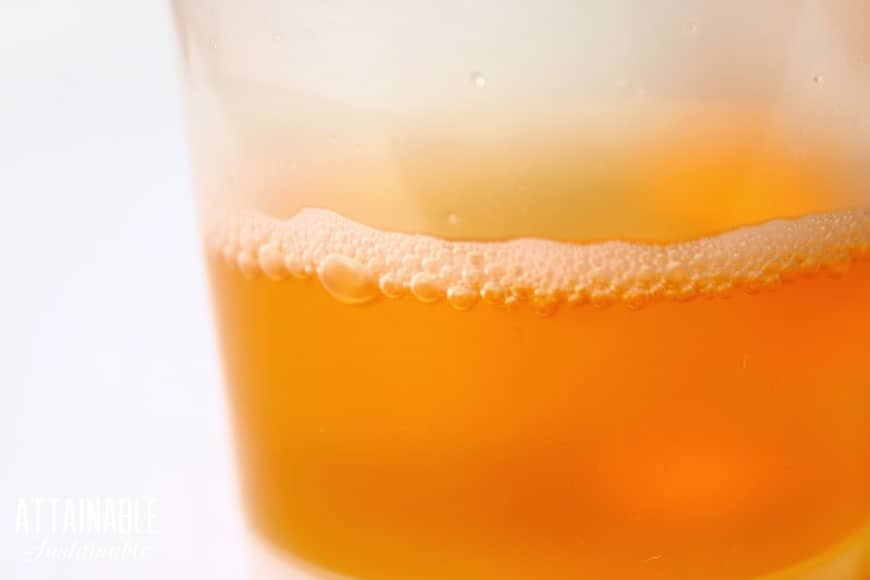
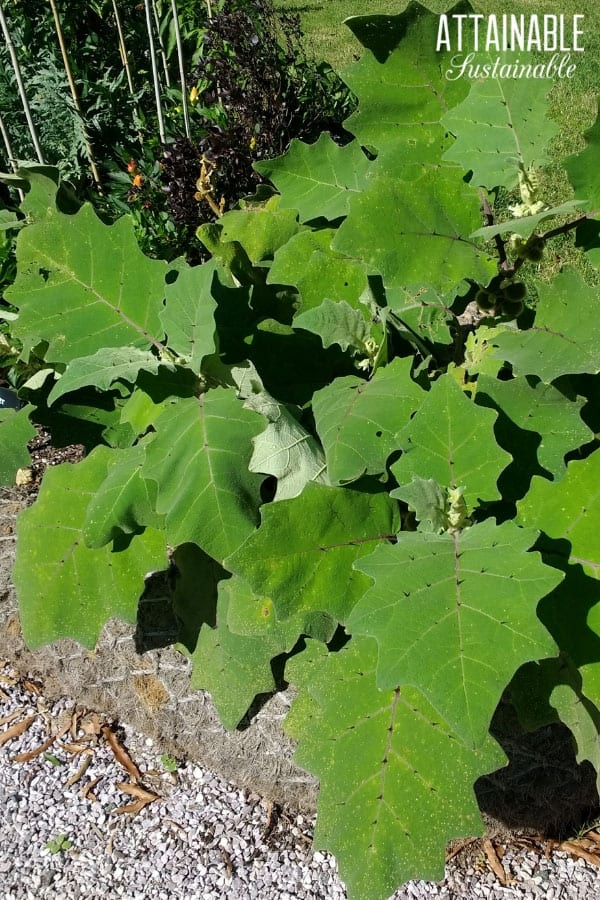
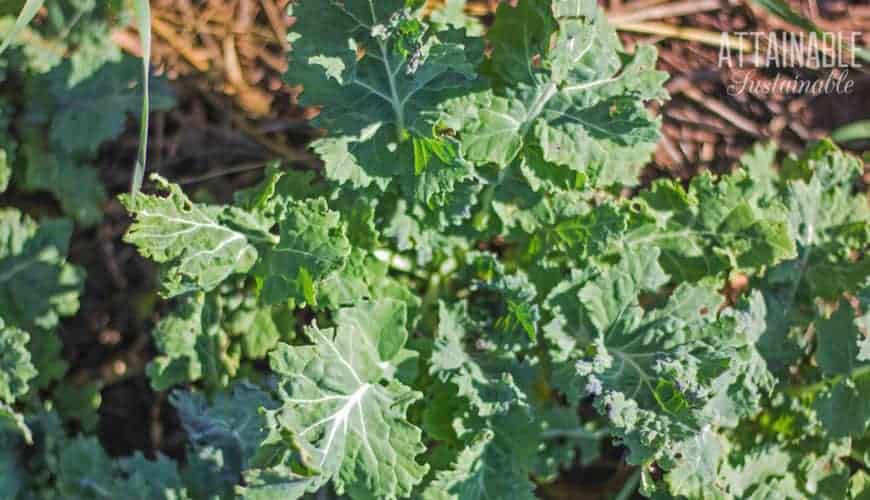


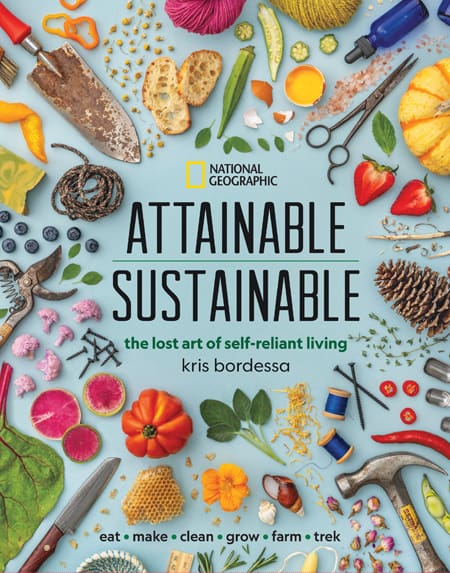
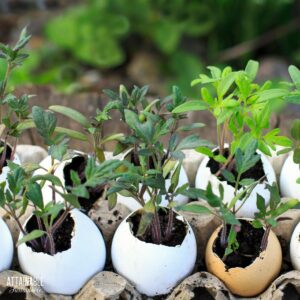
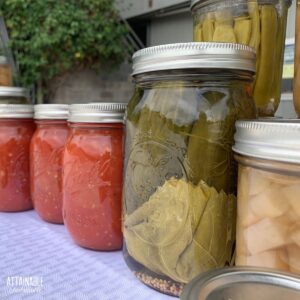

I have been using Urine for a year now and have great results. I dilute 25% but could cut that to 15% and it would be fine but need to be repeated more often. But I am wondering how long urine can be stored. Does anything happen to it after the urea is created?
I ask this because it is still winter and I want to store it long enough to use on my fruit trees once they begin to grow.
Now, that I don’t know. I can’t imagine it would *hurt to store it. You could also place a bale of straw outside and dump the urine there. Come springtime, scatter it as mulch.
In some jurisdictions it is illegal to store urine.
Just sayin’ 🙂
Can I use urine in daily watering? Will it make trees sprout better?
I don’t know about tree sprouting. You’d want to spread it around, as it were; too much isn’t great, either!
it also help deter deer and other garden pest away from your garden. I mean don’t pee on your peppers but ….sprinker (tinkle) around the perimeter
Thanks for the tips and information! Do you have any resources or links regarding the legality of using human urine in your yard or is this something you should only do in secrecy?
I don’t.
Honestly nothing is illegal about it to my knowledge. I think there could be decency laws but that’s less about urine and more about whether someone else sees you and gets disgusted. Just find a semi private spot. I have also found that living with my ocd disgust oriented mother i have to put it in an opaque container as the sight of bodily fluids is a disgust trigger, especially for those not in the know about this and onboard. (Also for that personality just don’t mention it to them if you live with them, I have yet to be able to fix that perception in them) but I’ve also heard people refer to it to other people as a euphemistic name like “fresh sourced organic urea” or just “homemade fertilizer” to not show what it even is.
how much water do i mix with urine to put in my pull behind sprayer.
Dilute the urine with water at a 10:1 water to urine ratio.
I would like to apply to an orchard of lemons, tangerines, mangoes and avocados
Give it a try!
I’ve seen the 10 parts water to 1 part urine (10 water:1 urine) everywhere. Though on the garden myths website which seems to be run by a rather analytical scientific guy, he pointed out that to make it match most commercial fertilizers you would use a 40 Parts water: 1 part urine or 40:1 ratio. At same time per the 10:1 ratio I just pee in a milk jug once or twice and it fills up like the bottom inch or so, and I fill the rest with water. Alternatively I do the same thing with my watering can. I haven’t had any problems. Only problem I really ever had was when I first discovered this I got a little over zealous with it and it was also winter and I pee on some bushes around our house. I wasn’t as educated at the time on fertilizer and growth stages. I think I went a bit too much and it affected a few of them when it got warmer and they started taking it up more. Same way when you pee on one spot on grass and it turns brown. That was the only really stupid thing I did. But that was more because I got excited and thought I could fertilize everything suddenly for free. The only other problem I’ve had with urine as fertilizer or any fertilizer I had was I have some fabric pots on patio where my mom has some plants in soil around it. I remember at one point as the growth stage and fruiting occured more I felt I needed to really add more one day and then a day or two later I felt like the heat had made the plants starving for water. Well I drenched the pots then, it caused run off from fabric pots into patio and ran down patio into surrounding hostas and plants. It caused some sort of orange and yellow response on a lot of the leaves. Thus can easily be fixed by either having a tray underneath each pot, or only fertilizing after watering as both urine nitrogen and potassium in potash is water solvable to my understanding so you don’t want to apply it and then water. At least how I think about it.
Also, I’ve been meaning to get around to doing some calculations on how to calculate npk of an organic fertilizer so I could add multiple ingredients and measure and approx the final npk and nutrients in it. This isn’t as hard as it sounds just a bit of work and research. But if I do this I can mix my custom fertilizer mix and actually copy instructions for a similiar npk fertilizer.
As a physician, I discount the suggestion that fresh human urine is rife with E. coli. Urine full of E. coli would have made one heckuva urinary tract infection! But I’m bothered by the idea of storing urine prior to applying it. I think that storing it would be more likely to grow more organisms than are present when the urine is freshly expressed. Putting it in the ground fresh (diluted if you wish) would allow the ground’s own organisms to feed off it rather than those chance organisms multiplying in stored urine. I’m no plant doctor, so just sayin’.
Like I said in the post, there is a wide range of opinions on this! Do what works for you and what you feel is best and most safe. 🙂
I have a neighbor with a gigantic compost bin. At the beginning of the season she used to get chicken bedding and manure from a friends farm or straight cow or horse manure. She adds that to her compost bin and them turns it daily. In the middle of summer that gets super hot and in the fall she has beautiful earthy smelling material for winter cover. The last two seasons due to Covid she used human feces just as her compost starter, it worked! The high temperature did not allowed pathogens to grow and her compost was beautiful by fall. Her elevated compost bin can be seen steaming on very hot summer days! Amazing!
Great, sounds like she has a good system that’s flexible even with Covid!
If you are having trouble with pests foraging in an open compost pile (which I wouldn’t mind if they didn’t strew it around and leave a mess), as we have had sometimes (deer, racoon, and skunk), then leaves and urine on top of the pile will deter them.
Nice article, Kris. Thank you for clarifying things for us.
Can i use human urine as a pesticide on plants, and if so how can it be used.
Most of my compost is brown so I use urine to help with my green. Seems to work pretty good.
As a kid I killed a huge patch of bermuda grass because of too much urine. I grew up in a house with 1 bathroom and 4 sisters….nuff said!
Haha, whatever works! Glad this is working well for your compost 🙂
I lived on a hippy commune a while back and we had signs in our composting toilets that read, “#2 only if you please – pick a designated garden area for #1” and we had areas in the garden with hanging tarps where people could “fertigate” with urine. Those areas were tilled before planting the next crop. Between that and the composted wastes that were incorporated into our soil mix, our fertilizer costs were very low for the number of people we were feeding.
If you are wondering what would happen, try dumping a liter of collected urine onto one spot in your lawn, pasture or one plant in your garden and watch what happens.
Good idea!
I am surprised that this is even up for discussion or education! The West’s over obsession with hygiene, sterilising, cleaning and infection control has been really good on one side, but Western citizens have thrown the baby out with the bath water 😀 😀
Urine IS a fertilizer. Urine has Urea and loads of other vital components required for good growth of plants in their early growing season. For centuries, farmers in Asia and Africa have used urine as the default fertilizer for growing tomatoes, chillies etc. In fact chillies respond so well to urine, especially male urine 😀 Using female urine has been discouraged. Not sure whether that was for privacy reasons or whether female hormones in the urea really did have a negative impact on the growth of plants.
Interesting about the male/female urine!
There was no mention of “male” urine – the study was looking at bacteria present in a limited sampling of females. The point was to counter the old idea that urine is sterile, something I was taught 45 years ago in survival training. I guess if it comes down to it, what is a little bacteria compared to death? But also, I learned when I went in for an operation that my male bladder is the permanent home of “Multiple-Drug Resistant Organisms”, probably as a result of being fed tetracycline antibiotics for about 9 years by my dermatologist for acne. We are supposed to know better than that now. If I had simply cut my sugar intake, my skin would have cleared, as I learned in time. We are still learning how to live in nature!
Human urine is a good organic fertilizer for the crop/ plant growth and contributes positively to the better crop yields. We’ve tried it in our demonstration farm, and it worked well. The mixing solution may depend on the type of soil and the crop variety.
One should consider any medications that may be passed through the urine
This is a very important concern. If you are taking any pharmaceutical meds DO NOT USE URINE in your garden.
Likewise, if you are on antibiotics, don’t use anyone’s composting toilet! It takes very little antibiotic to kill the beneficial microbiota that make a composting toilet work properly.
If Human Urine is good for crops, why cant I plant over my leach field? the leach field is the water and overflow of urine not the solids. The solids get pumped out every couple of years. Thank you
I guess one problem could be that you won’t know the dilution? That said, in the book Solviva the author talks about how one area of her garden *thrived the year their plumbing failed and they tossed urine out there.
When you think about how a septic or earthship type of sewage treatment system works, you know that the liquids pumped into the leach field have to be saturated with whatever the poop has / had in it (including bacteria). I’m no health professional and I have no data to comment on whether or not the soil above the leach field would also contain whatever the poop water contained. I have looked into earthship systems and they only plant landscape type (not for eating) plants over their “leach field” if you can call it that. Part of their choice for that may be the goal of placating building officials. There are a wealth of things I don’t know. I live in Reno, NV as of June of 2019. I have been saving my urine because I thought it might be a good thing for plants. We have wild horses here that are protected and allowed to crap wherever they want to. In the right season, if I choose, I can collect this crap for fertilizer. I have been pondering the possibilities of modifying an IBC container and filling it with horse crap, my pee and other organics to make some sort of powerhouse compost tea. Any thoughts?
Horse manure is an excellent fertilizer. Your compost tea sounds like it could be a great addition to the garden.
You are not supposed to plant over your leach field because our rules regarding such things are antiquated. But also, there could be an increased bacterial load in that water and you do not want certain deep rooted plants getting down into your pipes or manifolds and clogging them with root growth. We had a happy mulberry tree that kept invading the tiles and we had to place a barrier on that side to stop the roots. Not sure you have had to install or repair a leach field system, but it is not cheap. Just let the grass grow there and plant your garden away from that area. I have long wondered why I could not install a tank to capture septic water before the leach field for use in firefighting and in case of drought. I could probably “get away” with it, but not willing to reverse the process if I get caught!
How would you tread into that field for planting harvesting etc? That seems to be a logistics issue here
I too asked that question.
After checking several sources, the general consensus was that it is in fact ok to plant over your leach field.
I have a urine dilution schedule scaled for seedlings, transplants, and established plants. I have used urine on all my flower beds and potted plants. it works awesome.
I know this comment is late, but planting over your leach field (or what most call a septic field) would be damaging to your field. Septic fields are very expensive to replace and I wouldn’t recommend anything other than grass. Also, you may notice that those fields are designed to drain extremely well, which is the reason grass and anything else does so poorly when planted on top. Remember, the pipes for your leach field are buried pretty deep, so anything that is going in there isn’t at the surface which is why nothing wants to grow there and grass is always brown
I’ve been using urine both in my compost pile and diluted on my plant soil for many years. It works well. My roses love it. Sadly, there is such a bias against this that I keep the info. to myself. People ask me, “What kind of fertilizer do you use?” I answer, “Oh, it’s organic.” I’ve been using an 8:1 ratio, but perhaps I need to change this?
I think if 8:1 working for you, keep doing it. (I laughed at your “it’s organic” answer.)
Good point harmonia
I had some pecan trees that were unhappy in our acidic, calcium poor clay loam, so I began sprinkling egg shell powder and dumping my nightly urine capture around the base out to the drip line and within a couple of years the trees were producing more and larger pecans and the leaves were larger too. Now I get consistently better crops every year. My grapes also seem to be improving, although I rarely fertilized them before, so I guess any amount of extra nutrients would help.
Friends of mine always used wood ash on their grape vines and they
were Awesome
Being from an Island myself. I can most certainly guarantee the use of urine on fruit trees and vegetables is a win for the plant. My Dad 93 years old at death did this for his plants on Island over 75 years.
I can attest to the wonders of urine applications. I’ve been doing it for some time.
I skip the ‘wait’ period and simply pee into my watering can, then fill it up with water. The ratio seems unimportant (in my opinion) and I am probably at a 50:1 or 60:1ratio and still getting excellent results.
I do NOT broadcast to others that I’m doing this…and if they ask why my plants are so huge, I simply say, “If I told you my secret, I’d have to kill you.”
LOL. That seems like an easy solution.
I just call it “fresh bio-sourced urea” and let them figure it out! If your watering can is galvanized, you might be feeding zinc too, but the urine might shorten the life of your galvanized can, so be aware.
Your section “How much is enough/ too much” doesn’t actually state what volumes are safe/ optimal but only covers dilution and making sure that it doesn’t touch the leaves. Does this mean there is no real ideal volume or volume limit?
Seana – Your question is a good one and one that is also hard to answer with hard and fast recommendations. Remember that we are fertilizing the plants with urine, mostly for the nitrogen content. So it is going to depend on what crop you are growing, what the nutrient content of your soil is going into planting, and even how much watering or rainfall you are getting.
I can only tell you, then, how I practice fertilizing with urine. On our homestead, I use urine as a weekly option for fertilizing. I fill my watering can with a 1:10 dilution of urine:water and I go around the garden once a week and apply it where it seems needed. If there is any sign of low nitrogen – pale leaves, slow vegetation growth – I apply a dose. If there is any sign of high nitrogen, like excessive vegetation growth and little fruit setting, I skip it for a few weeks.
So it is very much a matter of just paying attention to what your plants currently need, as is the case for a lot of gardening questions. 🙂
Another use for urine in the garden and homestead, is to keep predators away. When we were having bear problems with our chickens, the State fish and game officer suggested that my husband pee around the coop.
Good point!
I have an old chamber pot in a “fancy” wooden toilet as decoration in my bathroom. This year I started using it and putting the urine around my garden trying to keep the deer, rabbits and other undesirables out of my garden. Seems to be working.
As a health care professional I would strongly disagree with this. Our food that comes from out of our country ie. Mexico has a high rate of E. coli etc due to laborers urinating in the fields. Also the plants use the urine to obtain their juices. Not recommended.
E. coli would come from workers defecating in the fields not urinating. Urine doesn’t normally contain E. coli unless the person has a rampant UTI and as Shannon stated, folk with UTIs shouldn’t be donating.
And I’ve got a degree in biology and am a clinical laboratory scientist so I probably know what I’m talking about. I’ve spent more than my fair share of hours examining urine on a microscope.
You go girl. I even know that E-coli comes from defecating. And I’m just a combat veteran/Mother of 3 boys.
He even calls himself a doctor but he doesn’t know that? Lmao
Wow! A combat veteran AND mother of 3 boys. I suggest that you leave out the word “just,” as you should be thanked for your service on 2 fronts. Thank you for your service.
Adele, thanks slot. You cleared my worries. But I think it’s More Safe to use own urine.
I have to echo what Adele said in terms of E. Coli. When this has been studied in controlled situations (i.e. they know the urine is clean going on, they know it came from healthy individuals, they know there was no feces involved) they have found it safe. But, I would say, if you have any concerns over the health of the donor, skip it.
I just did a search for E.Coli and Mexican urine/produce and got nothing – what is your source of this assertion? E.Coli is not commonly found in the urinary tract and is considered a fecal coliform. Maybe you got #1 and #2 confused?
E. Coli comes from defication. Urine is for the most part sterile. The workers are crapping in the fields. Sad but true
Oftentimes E. Coli on veggies comes from cow or pig field runoff.